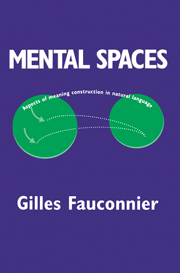Book contents
- Frontmatter
- Contents
- Foreword
- Preface
- Acknowledgments
- Introductory Note
- 1 Pragmatic Functions and Images
- 2 Roles and Multiple Connectors
- 3 Presuppositions: Floating, Transfer, and Projection Strategies
- 4 Counterfactuals and Comparatives
- Chapter 5 Transspatial Operators, Philosophical Issues, and Future Perspectives
- Notes
- References
- Index
4 - Counterfactuals and Comparatives
Published online by Cambridge University Press: 20 January 2010
- Frontmatter
- Contents
- Foreword
- Preface
- Acknowledgments
- Introductory Note
- 1 Pragmatic Functions and Images
- 2 Roles and Multiple Connectors
- 3 Presuppositions: Floating, Transfer, and Projection Strategies
- 4 Counterfactuals and Comparatives
- Chapter 5 Transspatial Operators, Philosophical Issues, and Future Perspectives
- Notes
- References
- Index
Summary
Counterfactuals
Traditionally, counterfactuals like “If men had wings, they would fly” are viewed as cases of possibly valid reasoning from premises that are false in actuality. Attempts to evaluate the truth conditions of counterfactuals involve, among others, two general kinds of questions: the problem of determining which true statements are combined with the false premises to carry out the reasoning (Goodman's puzzle; see Goodman (1947)) and the problem of determining when (and which) logical laws apply to counterfactuals. For example, (1) does not straightforwardly contrapose to produce (2) (Lewis (1973)):
(1)
If Boris had gone to the party, Olga would still have gone.
(2)
If Olga had not gone, Boris would still not have gone.
Linguistically, we do not directly tackle the logical problem of truth conditions for counterfactuals, but rather the cognitive-semantic question of how counterfactual spaces are set up and structured. This can be viewed, however, as another version of Goodman's puzzle.
Counterfactuality is a case of forced incompatibility between spaces; a space M1 is incompatible with another space M2 if some relation explicitly specified in M1 is not satisfied for the corresponding elements in M2. We focus on the case where a space is set up and is incompatible with its parent.
- Type
- Chapter
- Information
- Mental SpacesAspects of Meaning Construction in Natural Language, pp. 109 - 142Publisher: Cambridge University PressPrint publication year: 1994



